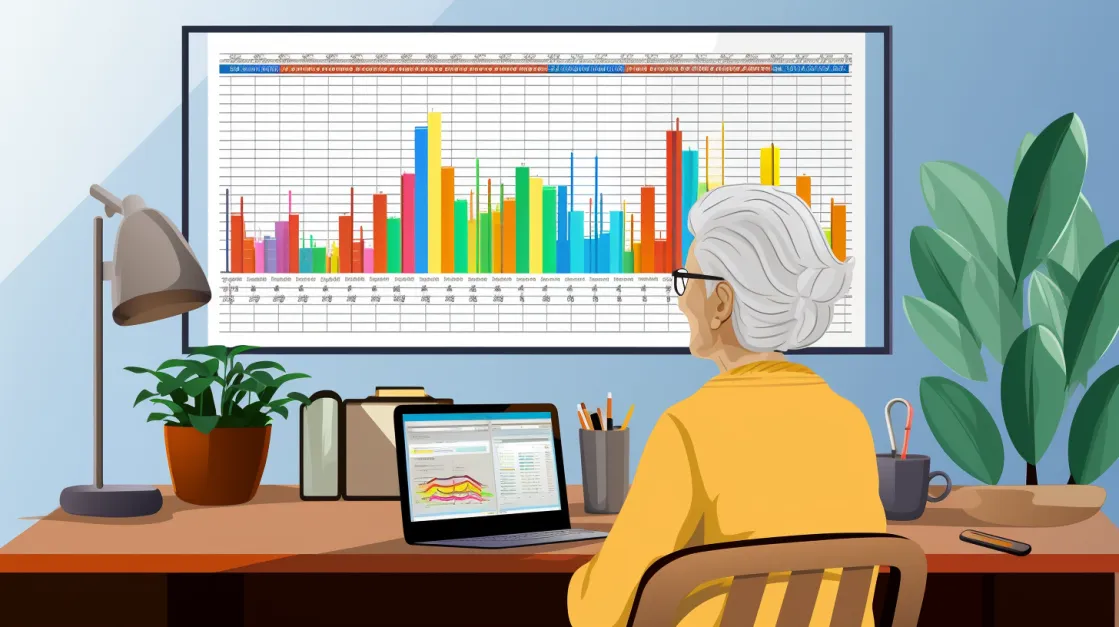How to Budget for Retirement Living Expenses

Planning your retirement finances can certainly feel like staring up at a mountain from its base – it’s daunting. When I first dove into the topic, I found that nearly half of Americans are feeling as lost and uncertain about their financial future in retirement years as you might be right now.
No need to fret because this stirred an immense motivation in me. After hours spent immersing myself into research on managing regular and unexpected expenses during retirement, what emerged was a user-friendly guide aimed at untangling these complex threads for you.
Think of expense types awareness, income management tips – all delivered with one goal: taking the complexity out of the equation so you can confidently navigate your way through planning your golden age finances.
In essence, it’s just that simple blueprint away – empowering you to step ahead smoothly in boosting up your finance game for the sunnier retirement days ahead!
Key Takeaways
- Know your retirement costs. Think about housing, health care, food, fun and taxes.
- Follow the money rules. Use 80% Rule for income and 4% Rule to take out cash in retirement.
- Watch factors like inflation rates and living location. They can shrink or grow your savings over time.
- Make a retirement budget. Look at current spending to predict future costs based on lifestyle choices.
- Manage your expenses wisely. Create a regular “paycheck” from different sources including savings for reliable earnings in later years of life.
Understanding Retirement Expenses

In retirement, different expenses take the fore such as housing and utilities or health care costs. It’s key to plan for other budget items like food, entertainment, and travel including accounting for potential taxes highly likely in your golden years.
Also anticipate unpredictable emergencies; having a well-rounded view of these myriad expenses is crucial for successful retirement planning.
Housing and Utilities
I need to budget for my home and bills once I retire. My home could be my biggest cost. So, it’s a good idea to think about where I will live and how much it’ll cost. If I still have a mortgage, those payments keep going.
Also, even if my house is all paid for, there are other costs like property taxes and fixes that may come up. Then we have utilities which include things like water, electric, gas or oil heat and trash pick-up fees! We can’t forget these types of regular bills when planning our retirement budget.
Healthcare Costs
Money spent on health care can be a huge part of your budget after you retire. If you’re healthy at age 65, it’s possible that health expenses could cost almost $600,000 for the rest of your life.
It’s also important to think about long-term care which can take up to $54,000 each year if needed. These big costs show why it is so useful to talk with someone who knows about money plans before retiring.
They will help make a plan that covers all needs and keeps future payments in check.
Food, Entertainment, and Travel
Let me share my thoughts about food, entertainment, and travel in retirement. You may see your grocery bill double when you stop working. Thankfully, there are senior discounts at some places to save money.
So, look out for those! Eating out might also be more common as a retiree since you have more time to enjoy meals with friends.
If we talk about fun times then being retired means lots of it! We tend to spend more on things that make us happy like going to movies or concerts for this reason. Just like with groceries, there are senior discounts here too so take advantage of them.
Now let’s talk about travel – an exciting part of retirement that draws many people in. Get ready to head all around the map during off-times when prices dip low! On average we already put aside $6,490 yearly just for our food and drink needs alone after crossing 65 years old mark which leaves plenty room left over for adventures everywhere else without straining finances much at all!
Taxes and Emergencies
Money paid as taxes and used in emergencies can surprise people who are retired. With retirement, you still pay taxes on certain incomes. My Social Security benefits, money withdrawn from my retirement funds, and annuity payments all go through taxation.
In some US states, even military retirees need to give a tax share.
Also, life after work comes with sudden needs for extra cash. This could be because of a death in the family or health issues that come without warning. One such cost is for long-term care which Medicare does not cover; one must set aside an amount for it too! Being ready helps lessen the shock when funds are needed fast.
Rules of Thumb for Retirement Saving & Spending

Let’s unwrap some popular retirement saving rules like the 80% Rule, advising that your post-retirement income should be about 80% of your pre-retirement earnings, and the 4% Rule offering a safe withdrawal rate from savings.
But wait, there’s more! Stick around to discover how you can make these financial theories work in your favor for a secure and enjoyable retirement.
The 80% Rule for Retirement Income
The 80% Rule is a tip for planning your retirement. It says you should aim to have about 80% of the income that you had before you stopped working. This rule helps make sure that you can pay for things like housing, healthcare costs, and fun activities when you retire.
Most people spend less money after they retire because they do not go to work or have kids at home. They also may own their homes and not have a mortgage payment anymore. But some costs could grow during retirement, such as medical expenses.
The 80% Rule wants us to be ready for these changes.
To reach this goal, the savings from our Social Security benefits and other sources will help cover the rest of our money needs in retirement.
The 4% Rule for Withdrawals
I use the 4% rule for my withdrawals. This rule says I should take out 4% from my retirement pot in the first year. Then, each year, that amount will go up a little to match inflation.
It’s a good way to plan how much money I can spend each year in retirement. And it helps to make sure I won’t run out of money for at least 30 years!
The Rule of 72 for Investment Growth
The Rule of 72 is a smart way to figure out your investment growth. It helps you see how fast your money can grow. All you do is divide 72 by the amount of return you get each year.
For example, if you have a rate of return on an investment of 4% per year, it will take about 18 years to double that money (because 72 divided by four equals eighteen). The result? Your retirement savings increase much faster! So, using the Rule of 72 gives us proof: the sooner we start saving and investing for our retirement, the better off we’ll be.
Factors Affecting Retirement Income
In examining your retirement income, it’s crucial to account for variables such as inflation rates and life expectancy. We need to consider affordable locations for living comfortably post-retirement too.
These factors significantly influence the total amount available in our nest egg after we hang up the boots.
Inflation Rates
Inflation is the rise in costs of goods and services over time. It affects how much money you need for retirement. High inflation rates can make things more expensive faster than your income goes up.
Your buying power gets less.
If prices go up 3% a year, a $100 item will cost about $134 in ten years! That means if you plan to retire in 10 or 20 years, what seems like enough now may fall short later on. It’s not just about planning to have “enough”.
You also need to think about how inflation rates might change over time.
Life Expectancy
People are living longer these days. This is good news but it also means your retirement savings need to last longer. It ties into how you plan for your budget in retirement. So, we must think of life expectancy as a key part when we look at factors affecting retirement income and planning how much money you will need when you stop working.
Healthcare costs often grow faster than other bills, so don’t forget them as part of your plan.
Affordability & Location
Living in a cheap place can make your money last longer. The cost of living varies from one city to another and from state to state. It’s smart to think about moving if you live in a costly area.
For example, New York is much pricier than Arizona. Living away from the city can save big bucks on housing costs alone!
How to Create a Retirement Budget

Start by analyzing your current living costs to gauge necessary future expenses. Identify areas where savings could be possible, such as downsizing or eliminating nonessentials. Predict retirement expenses like healthcare and travel based on your lifestyle preferences.
Compare these projected costs with your estimated retirement income, including Social Security benefits, annuities, and investments. Make adjustments as needed to ensure you have a sustainable budget that fits within your expected retirement income sources.
Examining Current Expenses
Let’s first look at our present costs. All of them count: house bills, car payments, food money, and even your coffee dates with friends. Getting a clear picture now will help plan for the future.
It’s also key to see where most of our money is spent. We must keep track of these areas when we retire. Are big bucks going on fun trips or eating out? If yes, we can adjust in retirement by taking cheaper vacations or cooking more meals at home.
Identifying Potential Savings
I start by looking at my current spending. I make a list of all the money I spend now. Then, I note down any areas where I can cut back. Maybe, I don’t need to eat out as much when I retire.
Or maybe, I won’t drive as often so my gas bills can go down too. Other costs will also drop in retirement like work clothes or travel to and from work every day. What’s left over after cutting things back? Those are potential savings that could help me reach my financial goals in retirement!
Projecting Retirement Expenses
To plan your budget, you should project your costs during retirement. Think about each type of expense. Housing could be the biggest one. This can include home repairs and property taxes too.
Health care will also take up a lot of your money in retirement. Parts of this are Medicare premiums that may go up very fast over time. You should also save for fun things like trips or gifts for grandkids.
Lastly, don’t forget to factor in taxes on certain types of income and withdrawals from save-up funds after retirement.
Comparing Expenses to Income
At this point, you stack your planned retirement costs next to the cash you’re set to get. The money may come from Social Security or savings like a 401(k) plan. Maybe you have an annuity too.
You look at what comes in and see if it covers what goes out. If not, don’t worry just yet! Short of cash? We’ll sort that out later when we delve into saving strategies.
Managing Retirement Expenses: Strategies and Solutions

Discover ways to manage your retirement expenses by creating a consistent retirement paycheck, utilizing the bucket strategy for your savings and even generating additional income on the side.
Don’t overlook optimizing your tax strategy to ensure that you’re not leaving any money on the table.
Creating a Retirement Paycheck
You need money to live in retirement. Think of it as a paycheck you give yourself. Instead of your boss giving you money, you get it from other places. Some might come from Social Security or a pension plan if you have one.
Other ‘paychecks’ could be payments from an annuity that gives you money on a fixed schedule, like every month or year. Also, think about using some savings for extra income. The three-bucket approach is smart here – short-term cash, longer term savings and then future investment pots can all play roles in paying your way through life after work ends.
Bucketing Your Savings
In my plan, each kind of cost gets its own savings bucket. For urgent things like health care, I set enough money aside. I use another bucket for fun stuff like trips or gifts for the grandkids.
Some buckets may stack up higher than others based on their needs. Dividing my funds helps to know where each dollar goes. This way, no surprise costs can drain all of my saving at once! It makes me feel safer and more in control of my cash during retirement.
Earning Side Income
You can make extra money in your retirement. This is called side income. For many, this comes from a hobby they love. It could also be from part-time work or selling items you no longer need.
Some seniors even rent out rooms in their houses for added cash flow. Side income can help with any unexpected costs that may come up. It adds a nice cushion to your retirement budget too!
Reviewing Your Tax Strategy
I look at my tax plan every year. It’s a big part of what I spend in retirement. Taxes can take a lot from the money I pull out of accounts like an IRA or 401(k) that are for retirement.
Social Security benefits might also get taxed if you make too much money elsewhere.
Regulations change and can affect how much I owe in taxes. Inflation rates and living longer are things to think about when making tax plans, too. Talking to a pro who knows about taxes is helpful with all this.
They keep up on all the new rules and help me adjust my strategy as needed.
Conclusion
Budgeting for your retirement years is a key step in enjoying stress-free golden years. By planning ahead, you can look after all expenses and still live the lifestyle you want. Make room for fun, health care and emergencies, while keeping an eye on home costs too.
With well-thought plans in place, roll into retirement ready to enjoy every moment!
FAQs
1. How do I budget for retirement?
To budget for retirement, you have to understand your essential and nonessential expenses. Divide them into fixed and variable costs before using personal budgeting software.
2. What kind of income can support my living expenses in retirement?
Retirement savings distributions are often used to cover living costs after retiring. You could also use passive income or pension distributions as robust financial support.
3. Are there tools that can help with planning my retirement budget?
Yes! One useful tool is a Retirement Budget Worksheet where you’ll record all your financial statements including housing expenses, transportation, regular debt payments among others.
4. Is getting a financial advisor worth it for managing these plans?
It may be beneficial to work with a Financial Advisor who has sound knowledge in behavioral economics reflecting on lifestyle goals along with estate planning beside core mundane tasks like paying bills or mortgage payments
5.What if an emergency happens during my retirement phase?
By setting up an emergency fund as part of senior finance literacy journey going parallelly side by side one would comfortably handle any potential investment losses; whereas mindful living helps maintain emotional well-being within such instances.
6.What’s the risk if not thoroughly planned ahead concerningleveraging post-retirement lifestyle?
Potential Risks include unexpectedly high healthcare costs, changes in tax laws affecting rate of returns on investments/saving accounts causing additional strain at delicate phase under some worst-case scenarios even extending obligatory working years prior decided peaceful retirements dates also known as deferred “retirement date”.






